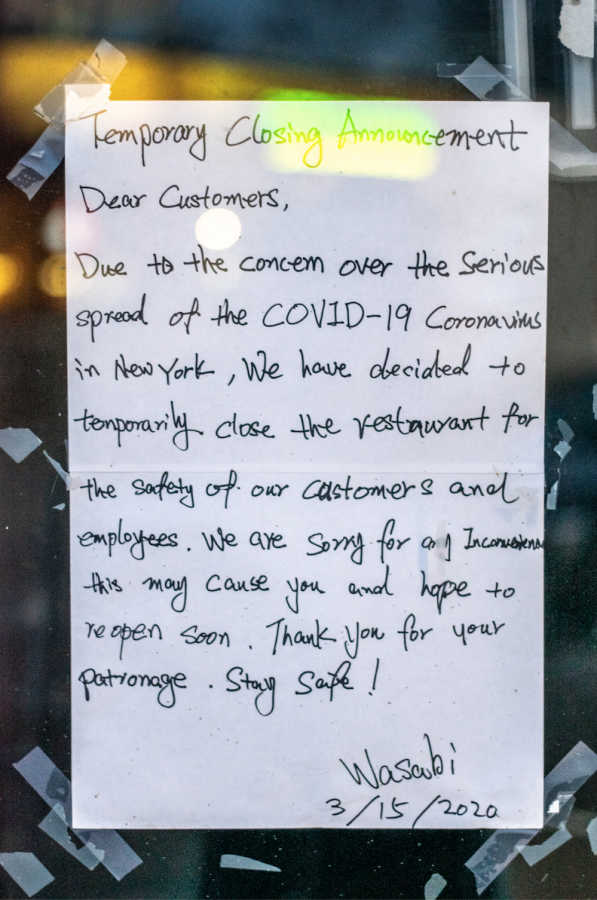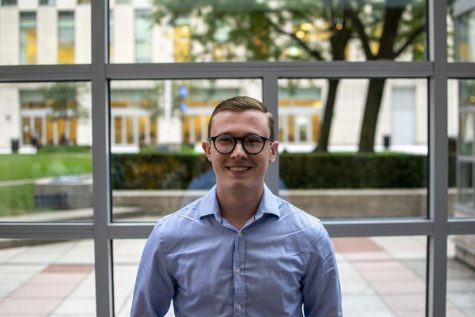The Empire State Sets the Bar for Coronavirus Handling
Five Guys Boroughs and Fries: New York City Politics
ANDREW BEECHER/THE OBSERVER
As the COVID-19 epidemic progresses throughout the US, New York State takes initiative to address the public health threat.
March 18, 2020
While other states, localities and the federal government drag their feet in the midst of the unprecedented coronavirus pandemic tearing through communities across the country (and globe), for the past two weeks, New York has been setting the gold standard with respect to handling this outbreak.
Although New York has the highest number of cases of the novel coronavirus in the nation as of March 17th, the state and city leadership is setting a strong example of preventive and proactive measures stronger than the majority of their 49 counterparts.
To hone in on an extreme example, while the state of Pennsylvania was urging its residents to stay home and avoid public places, Philadelphia Mayor Jim Kenney told his city’s residents to go out to eat. “We have to figure out a way that we can continue moving forward without panicking to the point that everything shuts down. We may be healthier but the economy will be in the tank, and we can’t have that,” he said at a news conference on March 14. Right — because the economy and resident’s health are totally mutually exclusive.
On the opposite end of the spectrum, after Lawrence Garbuz, a Manhattan attorney, tested positive for the coronavirus, Gov. Andrew Cuomo ordered a one-mile containment zone centered on the synagogue in New Rochelle where Garbuz attended. This containment process involved banning gatherings over 1,000 people and sending in the National Guard to distribute supplies. On March 13, a drive-through testing facility was also opened in that city.
This may all seem like old news considering that all public schools in the downstate region are now closed indefinitely. However, on March 16, Mayor Bill de Blasio directed all restaurants and bars in the five boroughs to suspend services, showing that New York was ahead of the curve in mitigating the effects of coronavirus in our state. It took another 12 hours for states in the surrounding area to follow suit. Although this may sound like a very short amount of time, keep in mind that New York’s number of confirmed coronavirus cases grow by the hundreds each day.
Other initiatives from the state include the manufacturing of state-issued hand sanitizer and the halving of occupancy limits for facilities holding under 500 people. Additionally, New York’s collaboration with private laboratories has given them the ability to administer over 6,000 coronavirus tests per day to suspected carriers of the virus.
However, not all credit can be given to the state government. Were it not for concerned leaders in New York City, bars, restaurants and schools would likely have remained open, at least for several more days. Doing so would have placed the city’s 1.1 million public school students in close quarters, along with teachers, support staff and administrators, creating a much higher risk for community spread of the virus.
Alarmed by the largely cavalier attitudes of many New Yorkers venturing to bars and restaurants, even after Cuomo slashed occupancy limits all of Broadway shows, City Council Member Mark Levine said that New Yorkers “don’t seem to understand what’s about to hit us and what we need to slow it.” Likewise, City Council Speaker Corey Johnson and Comptroller Scott Stringer expressed outrage that more folks did not heed the warning to practice social distancing.
These comments, along with those of the city’s teacher union and healthcare worker union both calling for action, helped lead de Blasio and Cuomo to shut down the city’s public schools.
Cuomo’s leadership in particular has spurred praise from across the aisle, even among his Republican rivals like Nicole Malliotakis who is running for Congress in New York’s 11th District, which includes all of Staten Island and parts of Brooklyn. She said he is “at his best” during an emergency situation.
Other Fordham students are also optimistic about New York’s response, still recognizing that individuals themselves will make the biggest impact. Eric Schneider, Fordham College at Lincoln Center ’23, said, “In reality the government can try to quarantine the public to inhibit the spread, but if the people don’t take the necessary precautions themselves then the virus will only spread.”
I am extraordinarily proud to know that this state is doing all that it can to possibly fight this virus, leaving nothing to chance or beating around the bush nonchalantly waiting for the federal government to get a grip on the situation.
Now, other states are following suit. Across the Hudson River, New Jersey Gov. Phil Murphy ordered all public and private schools to close in his state and is implementing a statewide curfew.
In neighboring Pennsylvania, Gov. Tom Wolf mandated that all restaurants and bars close, issuing a press release stating that those who chose not to “could face enforcement actions.”
While we have yet to see how this virus ends in the United States, and we don’t even know how the coming days and weeks will play out, we should all be able to look back with pride that the Empire State took swift and decisive action to combat its spread. Just as New York rose to the occasion after the Sept. 11 attacks, we once again send a clear message of diligence and hope to the rest of the nation.











